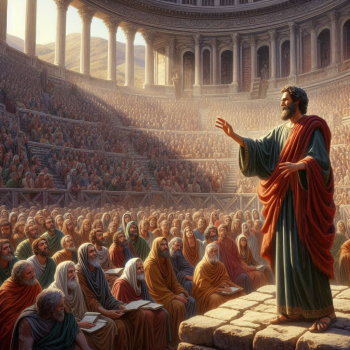All verses quoted here by our brother @Johann were written when the problem of Judazing converts vs Greek converts was ongoing and of critical importance for the early church.
You are losing ground friend--
Context of Judaizing and Gentile Converts
Judaizing Controversy:
Definition: Judaizing refers to the insistence that Gentile converts to Christianity must adhere to certain Jewish laws and customs, such as circumcision, dietary laws, and observance of Jewish festivals.
Biblical Context: This controversy is particularly evident in the epistles, notably Galatians and Acts, where Paul addresses the tension between Jewish and Gentile believers.
Council of Jerusalem (Acts 15):
Significance: The Council of Jerusalem was convened to address this very issue. The decision was that Gentile converts were not required to follow the full Mosaic Law but should abstain from certain practices like idolatry, sexual immorality, and consuming blood.
Outcome: This ruling was pivotal in shaping the early church's approach to integrating Gentiles into what was initially a Jewish movement.
The Role of "Repentance" in Pauline Epistles
The previous search for the term "repent" in the Pauline epistles yielded a limited number of direct occurrences. Here's a more detailed and corrected exploration:
Romans 2:4:
Text: "Or do you show contempt for the riches of his kindness, forbearance and patience, not realizing that God’s kindness is intended to lead you to repentance?"
Commentary: Paul emphasizes that God's kindness is meant to lead individuals to repentance, underscoring the importance of a transformative change of heart.
2 Corinthians 7:9-10:
Text: "Yet now I am happy, not because you were made sorry, but because your sorrow led you to repentance. For you became sorrowful as God intended and so were not harmed in any way by us. Godly sorrow brings repentance that leads to salvation and leaves no regret, but worldly sorrow brings death."
Commentary: Here, Paul distinguishes between godly sorrow, which leads to repentance and salvation, and worldly sorrow, which leads to death. This passage highlights the salvific importance of repentance.
Addressing the Broader Context
Judaizing Issue in Paul's Letters:
While Paul addresses the issue of Judaizers, particularly in Galatians (e.g., Galatians 2:4-5, Galatians 5:1-6), the concept of repentance is a broader theological theme that transcends this specific controversy.
Galatians 2:4-5: "This matter arose because some false believers had infiltrated our ranks to spy on the freedom we have in Christ Jesus and to make us slaves. We did not give in to them for a moment, so that the truth of the gospel might be preserved for you."
Paul's emphasis on faith in Christ rather than adherence to the law (Galatians 3:24-25) underscores his broader theological stance, which includes the call to repentance as part of the transformative process of salvation.
Conclusion
The term "repent" appears explicitly in key Pauline passages (Romans 2:4 and 2 Corinthians 7:9-10), and while the Judaizing controversy is an important historical context for understanding Paul's letters, the doctrine of repentance itself is a fundamental aspect of Paul's theology. It reflects a call to a changed heart and mind, crucial for both Jewish and Gentile converts. The broader theological themes in Paul's writings consistently emphasize transformation, faith, and a new life in Christ, which inherently include the concept of repentance.
Having said this
Yes, Paul did preach the doctrine of substitutionary atonement. This doctrine is evident in several key passages in his epistles. Let's examine some of the primary texts where Paul articulates this concept:
Key Texts on Substitutionary Atonement in Paul's Writings
Romans 3:23-25:
Text: "For all have sinned and fall short of the glory of God, and all are justified freely by his grace through the redemption that came by Christ Jesus. God presented Christ as a sacrifice of atonement, through the shedding of his blood—to be received by faith."
Commentary: Here, Paul clearly presents Christ as a "sacrifice of atonement" (hilastērion in Greek), emphasizing that Jesus' death satisfies God's justice and allows for the justification of believers through faith.
Romans 5:8-9:
Text: "But God demonstrates his own love for us in this: While we were still sinners, Christ died for us. Since we have now been justified by his blood, how much more shall we be saved from God’s wrath through him!"
Commentary: This passage underscores that Christ died for sinners, highlighting the substitutionary nature of His death as a demonstration of God's love and a means of saving believers from divine wrath.
2 Corinthians 5:21:
Text: "God made him who had no sin to be sin for us, so that in him we might become the righteousness of God."
Commentary: Paul explains that Jesus, who was sinless, was made to be sin on our behalf. This substitution enables believers to attain the righteousness of God, illustrating the exchange at the heart of substitutionary atonement.
Galatians 3:13:
Text: "Christ redeemed us from the curse of the law by becoming a curse for us, for it is written: 'Cursed is everyone who is hung on a pole.'"
Commentary: By becoming a curse for us, Christ redeems us from the curse of the law, indicating a substitutionary act where He takes on the penalty deserved by humanity.
1 Corinthians 15:3:
Text: "For what I received I passed on to you as of first importance: that Christ died for our sins according to the Scriptures."
Commentary: Paul delivers a core element of the gospel message, stating that Christ died for our sins. This aligns with the substitutionary atonement doctrine, where Jesus' death is seen as a sacrificial act for the sins of humanity.
Theological Significance
Paul's teachings on substitutionary atonement are crucial for understanding his theology of salvation:
Justice and Mercy: Substitutionary atonement addresses the need for justice by recognizing the seriousness of sin and God's requirement for a penalty. At the same time, it highlights God's mercy in providing Jesus as the substitute.
Redemption and Reconciliation: This doctrine underscores the themes of redemption and reconciliation, where believers are redeemed from sin and reconciled to God through the sacrificial death of Jesus.
Conclusion
Paul's epistles contain clear and explicit references to the doctrine of substitutionary atonement. He consistently teaches that Jesus' death was a sacrificial, substitutionary act that satisfied God's justice and enabled the justification and reconciliation of believers. This doctrine is foundational to Pauline theology and central to the Christian understanding of salvation.
You may as well concede @Pancho Frijoles 


